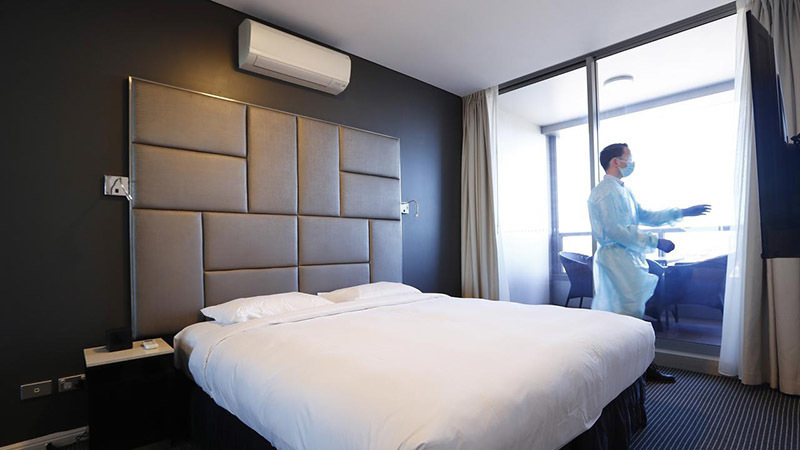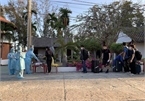
Sojo Hotel Ga Hanoi, a part of a Vietnamese owned hotel chain, opened in late December 2021 amid people’s surprise. While other hotels are facing difficulties and many have shut down, the hotel chain has been expanding in Nam Dinh, Thai Binh and Bac Giang.
Sojo Hotels CEO Nguyen Ba Luan said the competitiveness of the chain is the contactless hotel model, empowered by the latest technology which can better serve customers.
At the hotel, guests begin a non-touch process, from checking online to adjusting light, temperature and sounds via an app.
The hotel follows a new HR use model, under which every worker can undertake multiple tasks such as receptionist, bartender and tour guide.
Also opening in 2021, Wink Hotels is a Vietnam brand for Vietnamese. Hoa Pham, a representative of the hotel, said the smart hotel model receives guests at any time of the day and the room rate is counted every 24 hours. This means that guests don’t have to check out before 12 pm used at other hotels.
Thanks to high technology, membership card programs are diverse. Guests can use the services of the same chain, and accumulate interests when using the services provided by partners, such as meal discounts and e-hailing.
“Technology is applied to the travel experience, bringing a new style, and this is a growing tendency,” she said.
She said more hotels would open in Da Nang, Can Tho and Hanoi, under a plan to open more than 20 hotels in the next 10 years.
At Alma Resort, in order to maximize on-touch communications between guests and workers, Alma has upgraded its mobile app, and integrated the function of payment, allowing guests to make non-cash payment and access weather information by real time thanks to live weather cameras on the beach of the resort.
Quarantine service
Savills, which conducted a survey from 2001 to 2019, found that the number of international travelers decreased by 8 percent during SARS in 2003 and by 12 percent in the global financial crisis in 2009. The figure has fallen over the last two years because of the Covid-19 pandemic.
CBRE’s Q3 2021 report showed that the average hotel room occupancy rate was 26.2 percent and the revenue per room was $24.7, or VND568,000.
Having few guests, a quarantine service has become the major source of revenue for many hotels. About 20 hotels with 1,600 rooms in Hanoi now provide quarantine service, while Da Nang has 34 hotels with 3,000 rooms.
The figures are 25 hotels and 3,000 rooms in HCM City, of which 42 percent of hotels are in district 1 (13 hotels), 32 percent in Tan Binh district, and the others in districts 7, 3 and 5.
The hotels in Tan Binh district and near Tan Son Nhat International Airport had an occupancy rate of up to 78 percent.
Turning hotels into medical quarantine facilities with the occupancy rate of up to 78 percent was the way out for many hoteliers.
It’s estimated that 10 percent of hotels have been converted into quarantine facilities and the figure could increase to satisfy the demand for quarantine.
Hotel restaurants have begun promoting online sales via digital platforms.
Nguyen Huu Nam Phuong, Marketing Director of Majestic, said the pandemic has forced hotels to change drastically to adapt to the new circumstances. Most hotels now have to use digital technology to better serve guests.
Recovery
Though the pandemic has impacted the hospitality sector, hoteliers still see many reasons to be optimistic and have designed plans to expand their business in Vietnam.
A series of new brands are expected to debut in the resort tourism market, including Grand Mecure, Fairmont, Eastin, Four Seasons, Lottee, Dusit and Wink Hotel with 1,200 rooms in 2022-2023. Vietnam will attract a high number of foreign travelers once travel restrictions are removed.
IHG Hotels & Resorts has announced a plan to develop resorts in the next two years and launch four more brands as a part of a plan to recover after the pandemic.
According to Serena Lim of IHG, more hotels will be opened to serve domestic clients in Hanoi and HCM City areas, and in industrial centers such as Vinh (Nghe An), Hai Duong, Hai Phong and Binh Duong. It also is building resorts targeting family guests in Quy Nhon (Binh Dinh), Sam Son (Thanh Hoa) and Hoa Binh.
IHG’s Rajit Sukumaran said: “All our hotels in Vietnam have welcomed guests back and we have noticed the growth in number of hotel rooms booked for resort and business purposes.”
“This shows that factors to promote growth that we saw before the pandemic can be maintained, and the hotel sector will regain growth momentum in the near future,” he said.
Duy Anh
Five-star hotels now sell street food
Upscale hotels are facing enormous difficulties due to the recent Covid-19 pandemic. Their solutions to the dilemma have been very creative.

Hospitality sector seeks ways to maintain operation amid pandemic
As Ho Chi Minh City grapples with the COVID-19 outbreak, hotels have actively adapted to the situation by offering paid quarantine services to maintain their operation.